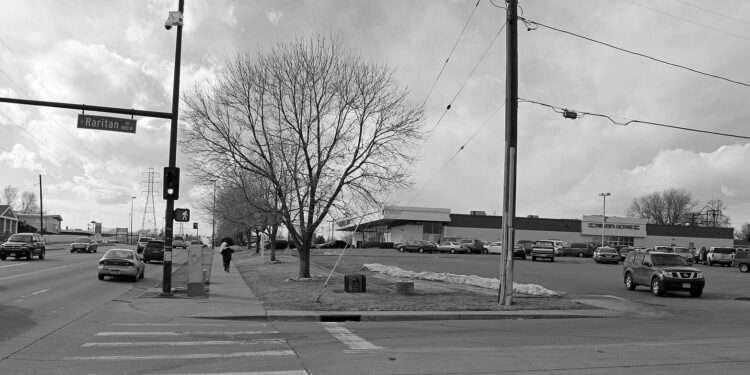Removing parking requirements for new buildings could help thousands of Coloradans who struggle to afford housing.
There is a shortage of over 106,000 homes across Colorado, according to a recent study by the Colorado State Demography Office.
Nearly 90% of the lowest-income households in the state spend over one-third of their pretax income on rent or mortgage payments. That means they pay more on housing, as a percentage of their income, than is considered affordable.
The cost of providing parking – borne by developers and passed on to residents – helps push prices up. Parking minimums may be mandated by city ordinances or demanded by lenders. Some renters prefer apartments that come with dedicated parking.
Structured parking can cost as much as US$50,000 per parking space, according to Denver’s Community Planning and Development office. Off-street surface parking, though cheaper to construct, requires dedicating valuable urban land to parking lots.
We are a law professor and urban planning scholar who worked with data scientists at the Terner Center for Housing Innovation to model how parking requirements affect the development of multifamily residential housing in the city and county of Denver.
Cutting parking boosts construction
We found that cutting minimum-parking requirements would likely boost housing construction in Denver by about 12.5%, translating into roughly 460 more homes per year.
This is a surprisingly high-impact result for a single, relatively simple policy change. We published our findings as a white paper with the Rocky Mountain Land Use Institute in July 2025.
In August 2025, the Denver City Council eliminated parking minimums for new buildings.
Denver followed the lead of other cities such as Boulder, Longmont, Austin and Minneapolis that have all recently abolished parking minimums.
In 2024, the Colorado legislature also removed parking minimums near transit hubs statewide in order to increase housing supply. However, that effort has been challenged in court on the grounds that the state mandates infringe on local government prerogatives. This legal tug-of-war underscores the importance of Denver’s decision.
Parking can be expensive
Before the policy change, market-rate apartments in Denver were required by law to provide as many as one parking space per unit. In a 200-unit building, parking could add millions of dollars to the developer’s costs.
Parking requirements are often determined by a formula. Based in part on an outdated view that modern cities should be car-oriented, cities around the country, including Denver, passed zoning codes in the 1950s and 1960s that created legal requirements for the number of parking spaces that new housing projects must include.
Land is expensive in high-demand cities like Denver. Dedicating part of a building’s footprint to parking imposes both a direct cost – because developers must pay to build the parking – and an indirect cost, because it leaves less space for housing. These development costs are passed along to renters and owners, decreasing affordability.
Reducing parking requirements lets developers build only the parking spaces that residents want or need.
Eliminating parking minimums
We built a simulator that estimates the total number of apartments expected to be built in multifamily, market-rate rental developments in Denver in one year. It then allows for a comparison of possible outcomes based on changing policy assumptions.
Our predictions factor in:
- Building size and allowable unit counts for parcels.
- The type of development and corresponding number of units that are likely to be financially feasible.
- The probability that parcels might actually be developed in the future based on a statistical analysis of historical Denver development data.
Following guidelines developed by the Lincoln Institute of Land Policy, we modeled 75 scenarios. They included five potential parking policies tested across five economic environments and three sets of assumptions for developer-driven parking inclusion.
Changes would bring hundreds of housing units
Our prediction that eliminating parking mandates in Denver could result in approximately 460 additional multifamily units per year is based on three assumptions:
- Somewhat unfavorable economic conditions, including high interest rates and relatively low margins for developers.
- Elimination of all regulatory parking mandates.
- Voluntary construction of 0.5 spaces per unit near light rail and 1.0 spaces per unit away from light rail.
We find that eliminating parking minimums creates more options for developers and renters. Developers will still build parking where needed or demanded by city residents.
Eliminating mandatory parking requirements offers several additional benefits.
The city will save labor costs associated with enforcing parking requirements, reducing housing costs.
The policy change frees up land for more economically productive uses and for desired civic infrastructure such as sidewalks or green space. Developers freed from building parking are also more likely to invest in beautifying their building for residents and pedestrians.
Removing parking minimums can increase the flexibility to use small undeveloped or underdeveloped parcels for “missing middle” forms of housing, such as duplexes or triplexes. These forms of housing provide “gentle density,” meaning they do not significantly alter neighborhoods but still make them more affordable for lower- and middle-income people and increase the city’s overall housing supply. It can also allow for the adaptive reuse of historic buildings that may have been built before the city required on-site parking.
And finally, eliminating a requirement for surplus parking spaces allows more compact, efficient forms of development, which results in more walkable cities and more connected neighborhoods.









Beyond the spectacle, Kansas City prepares for World Cup reality